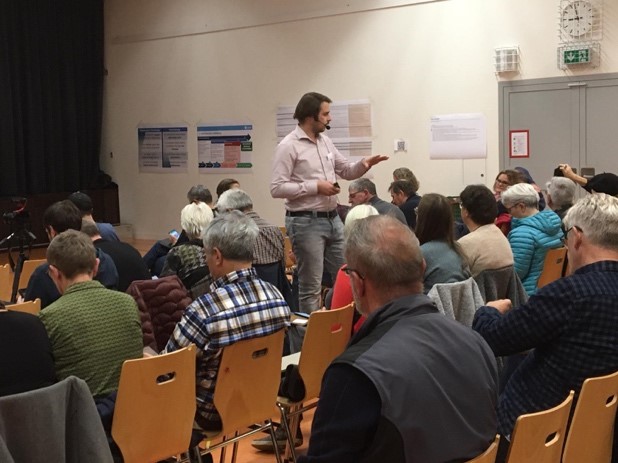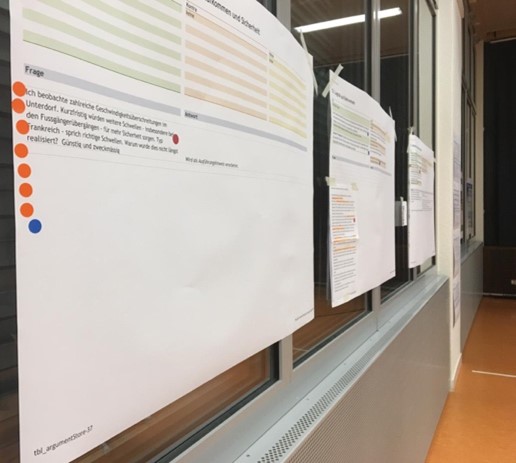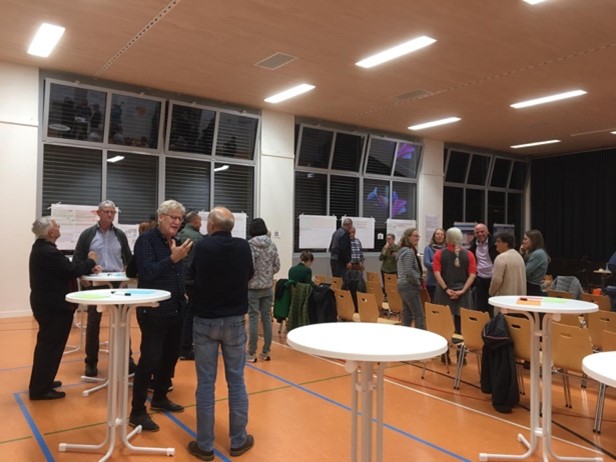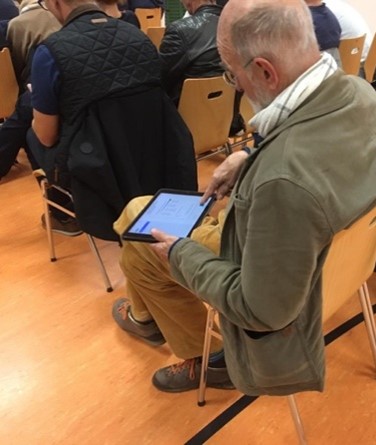The autumn sun is setting early over the mountain peaks overseeing Geuensee, a municipality with over 2.200 inhabitants in the canton of Luzern, as a team of young volunteers and staff are preparing the local sports hall for “the decision process”. The long-awaited evening of 8th November is the first of two identical workshop evenings where the inhabitants are invited to give their vote for one of 13 possible choices.
Around 40 people are expected to take part in this participative decision-making process, employing in-person facilitation, digital technologies, and fuzzy methods, to identify the most community-supported decision.
As the team of youngsters is hanging posters of the possible choices and their arguments, synthesized from the over 500 entries submitted by the community over the summer, the moderator is taking a last look at the slides. His name is Benjamin Emmenegger. He is the mind behind the concept, a fuzzy methods PhD student, co-founder of ajato GmbH, and council member from a nearby locality.

His help was requested almost a year ago, due to the complexity of the problem. Unterdofstr is a street populated by families and children, but it is also the only way of access for some industrial companies to their headquarters, amongst which a car parts recycling company. It is also the primary route for citizens to access a nearby locality. Attempting to increase the safety of the street, the municipality has also installed pillars that force drivers to slow down. At peak-hour, the street is a nightmare and a danger for children and drivers alike.
On December 1, 2021, a plan to solve to the problem was presented to the community for public consultation. The process resulted in numerous submissions, protesting the proposed solution.
Once Benjamin Emmenegger took charge of the operation, he designed a participative process that culminates with two voting nights. First, he focused on clarifying what the population wanted and collecting all the options and arguments.
He distilled all the information collected into a total of 13 options, accompanied by the summary of the pro and con arguments, as well as the questions and risks. This process of solution crowdsourcing has the objective to neutralize any form of rhetoric and political or even subject-based

supremacy, leading the search into the core of the community’s will.
By giving equal decision power to all the population aged 16 and above, he is inviting everyone to assume responsibility for the final top choices, which will go to the next step of feasibility verification in detail.
The voting night
At the first night of voting, the attendance surpasses the expectation. As Benjamin leads them to review each of the 13 posters and “vote” on their favorite arguments, he is making sure that everyone thoroughly understands the options. He is thus avoiding information asymmetry and can capture the true preference of this community, connecting them to each other over this sensitive issue.
 Some of the locals take up the microphone and verbalize their concerns, others pick up the colored papers and add new points of view. It is really a collective work, led by the calm and optimistic voice of Benjamin. From time to time, his joke makes the audience laugh. It is obvious that they trust him with this decision, and they enjoy this innovative process.
Some of the locals take up the microphone and verbalize their concerns, others pick up the colored papers and add new points of view. It is really a collective work, led by the calm and optimistic voice of Benjamin. From time to time, his joke makes the audience laugh. It is obvious that they trust him with this decision, and they enjoy this innovative process.
The night then continues to the fuzzy voting step. Young team members equipped with tablets help anyone who encounters difficulties. The app was developed only for this evening as a minimum viable product by a team from students from the university of Lucerne. The simple to use platform shows 2 sliders, asking how much support and resistance one has towards one option or the other. But the sliders are not numbered, the slider moves between different verbal statuses. Through this, Participants can assign their opinion in comparative language expression. Finally, there is also the choice for Yes or No. The exact evaluation and the result will be published in December in the form of a report as well as a scientific paper.
The two hours of workshop fly quickly. Tightly wrapped up in the community spirit, the audience casts their confidential votes. You can almost feel the sigh of relief as this team effort produces its result. Team and participants, they have all done their job well and look forward to the second  workshop. The same journey will happen, onboarding the rest of the inhabitants who were not able to attend this time. After that, the decision will be announced, only 1 year and 11 days after the previous announce in 2021. This time, a more resilient and cohesive community will be able to receive it with responsibility and work towards its implementation.
workshop. The same journey will happen, onboarding the rest of the inhabitants who were not able to attend this time. After that, the decision will be announced, only 1 year and 11 days after the previous announce in 2021. This time, a more resilient and cohesive community will be able to receive it with responsibility and work towards its implementation.
The short apero that follows sees everyone cordially chatting over a beer, as the team carefully collects the precious materials.
Thanks to the support of:
- Edy Portmann and his Team of fuzzy-researchers – University Fribourg, HumanIST Institute
- Anna Reiter, Janine Wapf, Hansruedi Estermann, Angelo Petterutti and Romeo Venetz – Municipality and spatial planner
- Nicole Zimmermann, Corinne Spoering, Fabio Stecher and Daniele Mulheim – University of Lucerne
- Barbara Schnyder, Andri Heimann, Reto Abächerli, Ramon Casutt – various professionals
- Mathias Schmid, Nives Edler, Yves Emmenegger and Philipp Wandeler – ajato GmbH
- Region Sursee-Mittelland in the person of Beat Lichtsteiner
Many further inspiring people and supporters
Report Case Study Geuensee – 2022-11-22 by Georgiana Bigea and Benjamin Emmenegger, both PhD at the University of Fribourg
